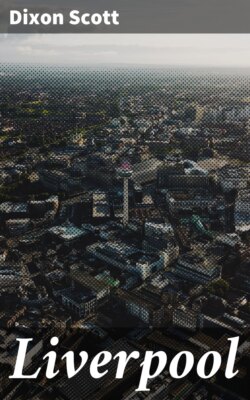Читать книгу Liverpool - Dixon Scott - Страница 7
На сайте Литреса книга снята с продажи.
§ 4.
ОглавлениеTable of Contents
Much of this unexpected loyalty to certain salient attributes, unvarying and individual, is due, no doubt, to the brevity of the period in which her final growth took place: the pressure and intensity of the moment begot, of necessity, a kind of concentrated civism. And much of it, too, is due to a certain physical peculiarity which it is perhaps worth while remarking. The City and the River, of course, have now become a roaring avenue between the hemispheres; but none the less, Liverpool, in a certain narrow, internal sense, cannot be regarded as other than side-tracked. Unlike Manchester, she lies some distance away from the great highways that link north with south, and even to-day the tradition of London’s remoteness still to some extent adheres. This isolation—an isolation that was felt very keenly in the early days of her growth—must have helped, in some measure, to breed that spirit of independence and self-reliance. She had to fight for herself. Her River made her too strong to be crushed by the disadvantage, and gave her more than all the power she needed to transform that initial weakness into a positive stimulus to especially emphatic effort.
So the River reappears; and I like to think that it is, in the end, to the influence of that superbly dominating presence, even more than to the influence of these factors of concentrated growth and isolated station, that the City’s paradoxically assonant announcements are to be attributed. It is, as we have seen, the City’s raison d’être, the chief orderer and distributer of her people’s vocations; and in that way alone it interweaves class with class, provides merchant, clerk, seaman, and dock-labourer with a common unifying interest. But with this dictation of tasks, with this provision of a tangible leit motiv that runs through and conjoins the efforts of several hundred thousand workers, the co-ordinating influence of the River can scarcely be believed to end. As a controller of physique, for instance, slowly reconciling disparities, its effect must be incalculably potent. It is a reservoir of tonic airs; it renews and revivifies the common atmosphere; it sets a crisp brine-tang in the heart of every inhalation. Some kind of mental and physical conformity, not easily to be defined, but still remarkable, that democratic sting quite conceivably creates; and some kind of subtle solidarity, too, must certainly result from the constant, unforgettable presence of a piece of outer Nature possessing so large a share of unremitting loveliness. From the fierce beauty of the River, indeed, there is no possibility of escape: its scale is so vast; it thrusts itself so exultantly upon one. It is not only the strange powers that belong to moving waters that it exercises; it trails with it as well, into the very core of the City, a great attendant sweep of unsullied and inviolable skyscape, and burns great sunsets, evening after evening, within full gaze of the town. The imaginative effect of all this insistent pageantry cannot, indeed, be easily overestimated. And I certainly believe that it is one of the great forces that weld this diverse city-full into so curious a unanimity.
